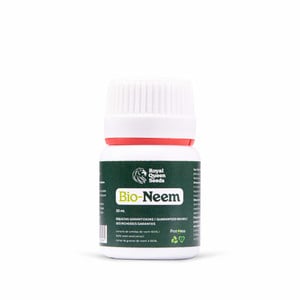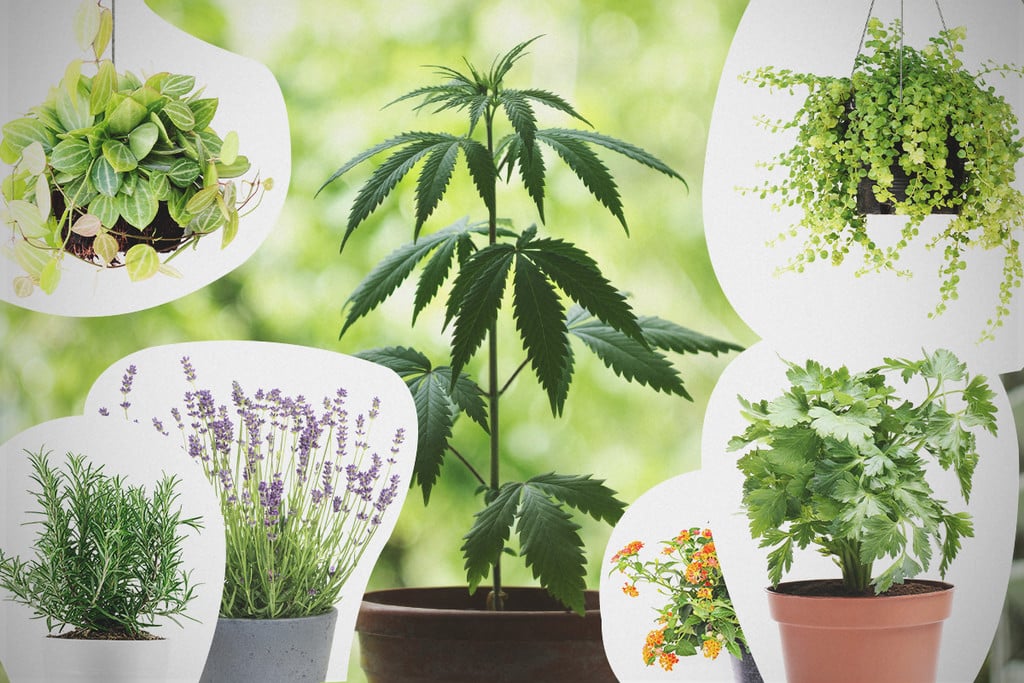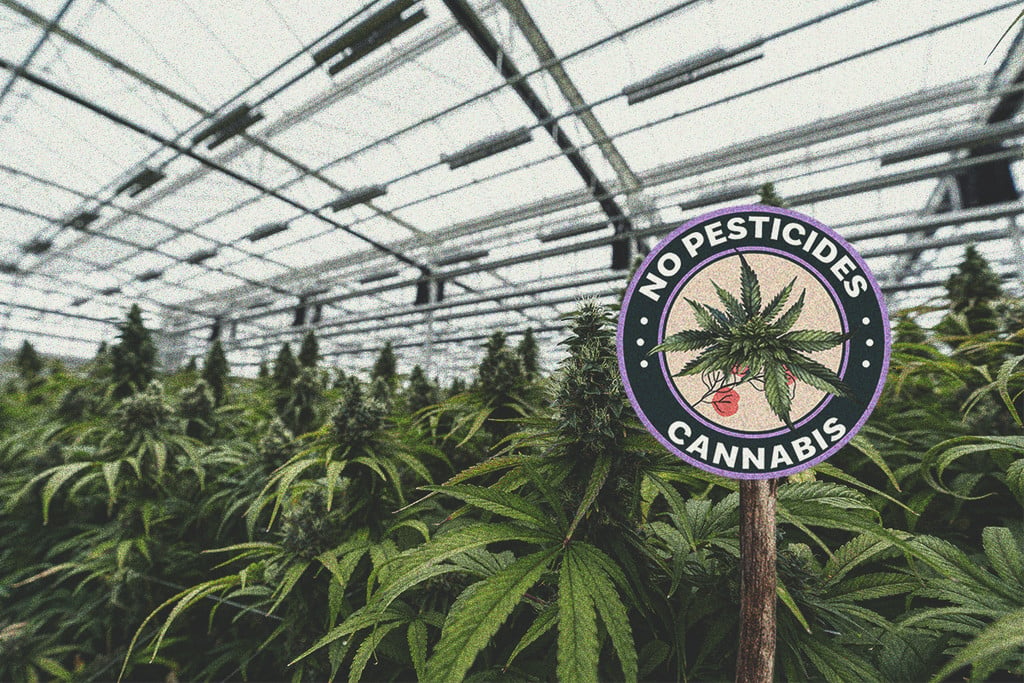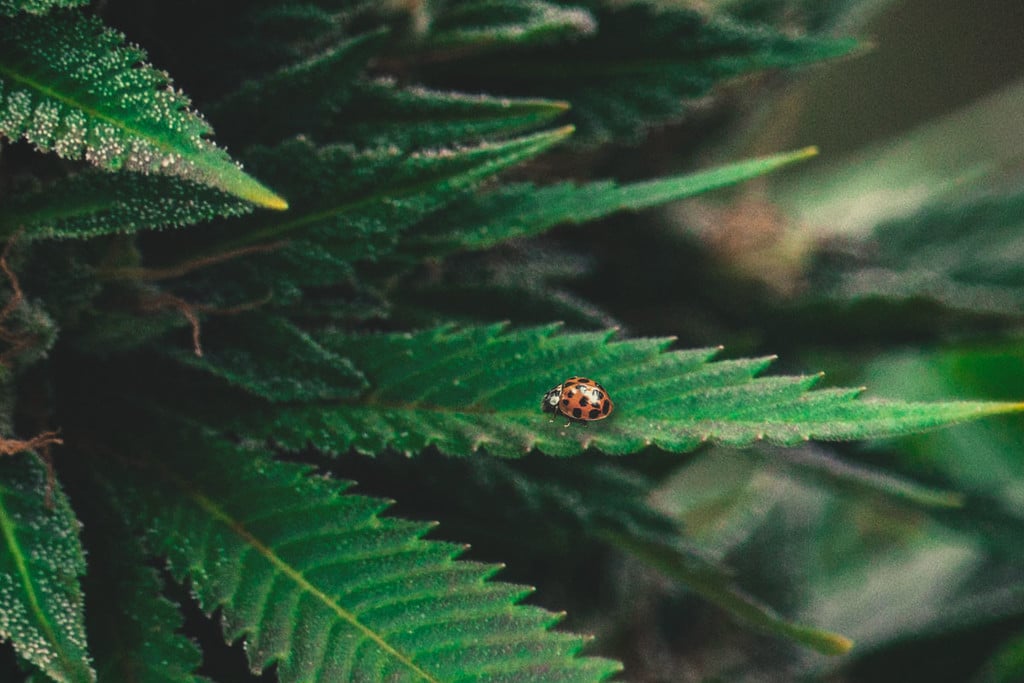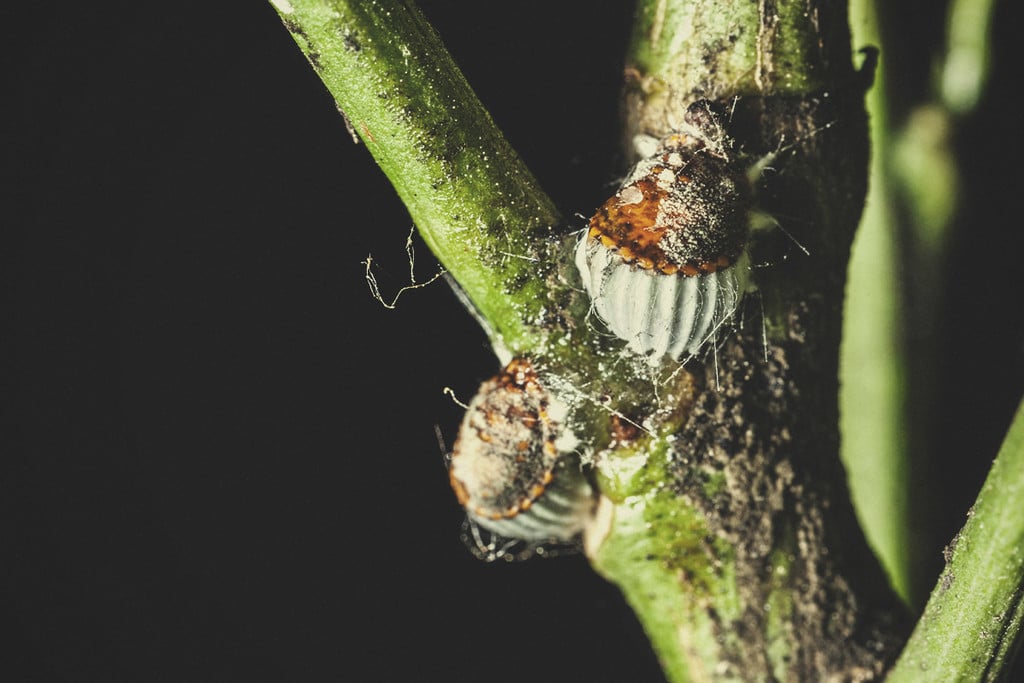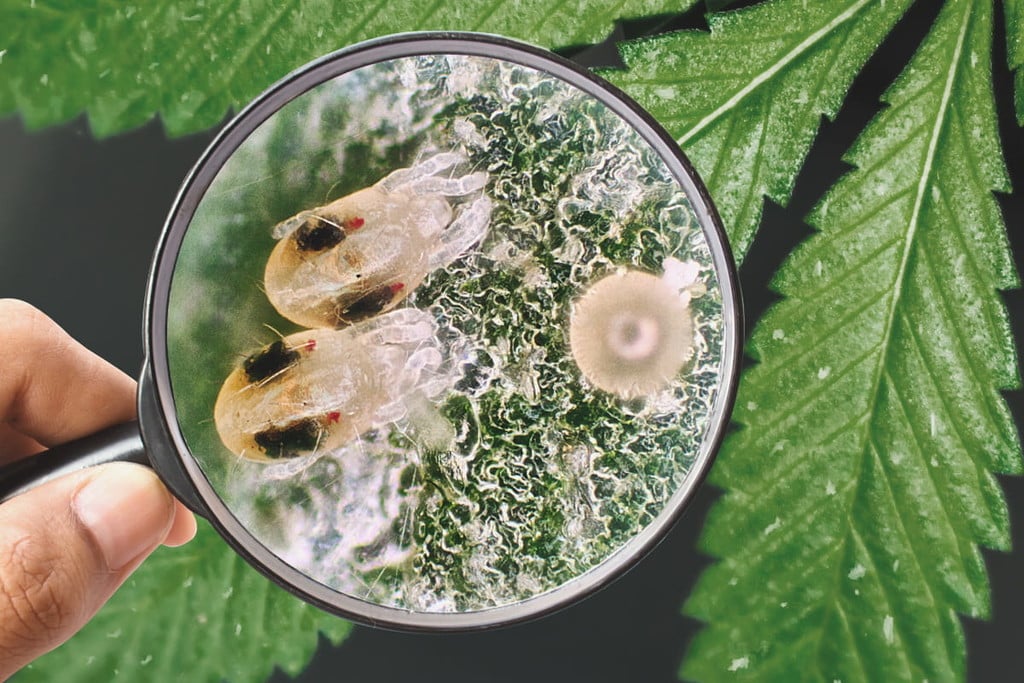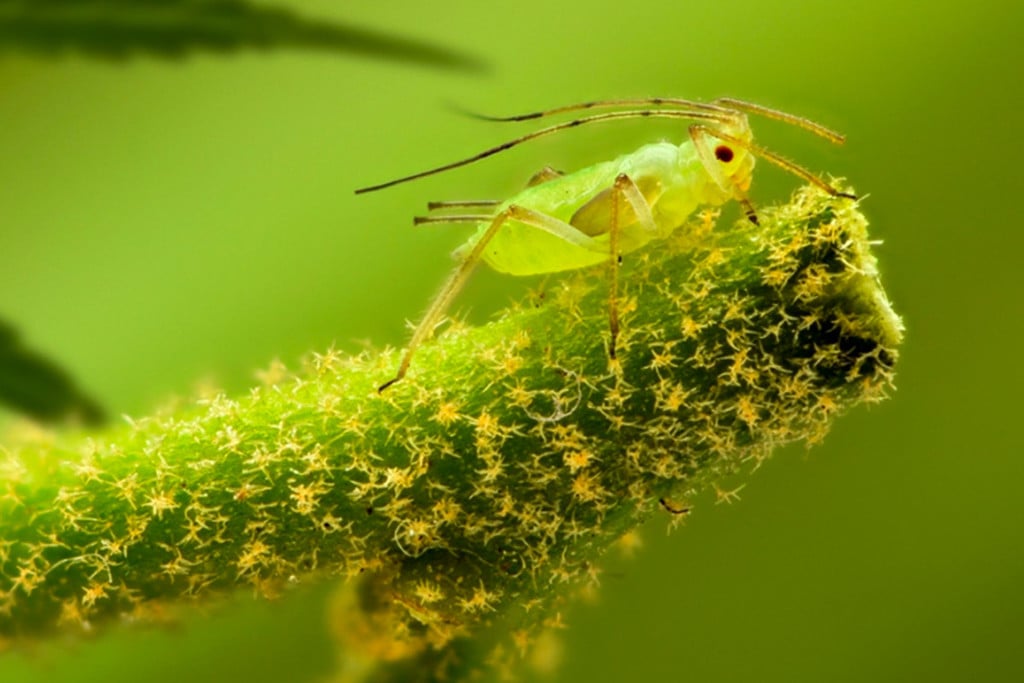.
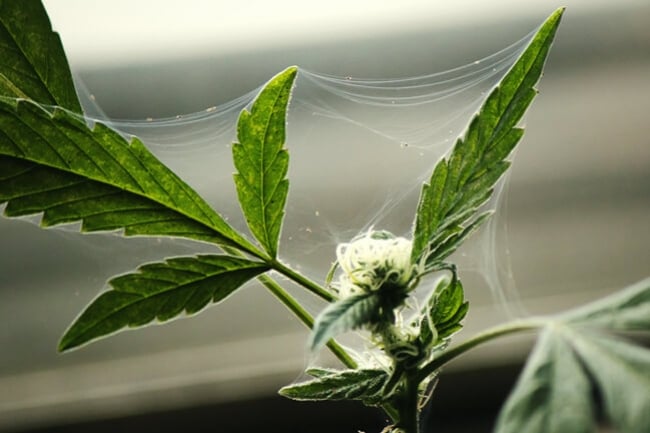
How to Protect Your Outdoor Cannabis Plants From Bugs
Gardens offer us a slice of paradise. Not much comes close to inspecting your plants in peace at sunrise or sunset. Despite the serenity, growing weed outdoors comes with several challenges, including pests. But you don't have to let them run rampant. Below, you'll learn tried and tested preventative measures for keeping bugs off your weed plants.
Are you tired of seeing your cannabis plants crawling with aphids and covered in spider mite silk? Are you wondering how to keep bugs off outdoor weed plants? Well, you’re in the right place! You’re about to undergo a masterclass in cannabis pests, preventative measures, and effective treatments. Let’s go, grower!
Contents:
Growing Outdoors: Cultivating in Occupied Territory
Growing weed outdoors comes with many benefits. You get to spend time barefoot on the Earth, exposing your body to beneficial negative electrons[1], and you introduce yourself to beneficial microbes in the soil that boost serotonin[2]. You’ll also spend a healthy amount of time in vitamin D-producing sunshine, surrounded by colourful and aromatic plants. This sounds like paradise, right? It sure is a wonderful experience, but it also comes with some downsides.
When cultivating cannabis inside, growers have almost complete control over their situation. As such, there is often a reduced risk of pesky pests. Outdoors, however, growers are raising plants in occupied territory. Before they’re developed, gardens belong to a host of insects and other species. And indeed, many of these critters continue to linger long after domestic gardens are established. While some of them are beneficial, a handful have an appetite for weed plants.
Cannabis Cultivation: Knowing the Enemy
The legendary military strategist, Chinese general, and author of The Art of War, Sun Tzu, stressed the importance of knowing one’s enemy. Procuring information on the nature, movements, and intentions of opponents drastically increases the efficacy of preventative measures and counterattacks. Although it might not occur on a typical battlefield, many growers end up waging war against certain weed-hungry insects.
Aphids
Aphids are one of the most common cannabis pests. These little critters cause two major problems. First, they fall into the category of sap-sucking insects, using their needle-like mouthparts to puncture plant tissue and extract fluid. Because plants rely on sap to transport nutrients and water, a large infestation of aphids can stunt growth and sometimes kill plants.
Second, even after the aphids are done feeding, the sap flow continues for a while, leaving behind small dots of sap, called honeydew. Some species, such as honeybees, forage for this sugary treat. But it also attracts fungi, such as sooty mould, that can eventually cover leaf surfaces and adversely impact photosynthesis.
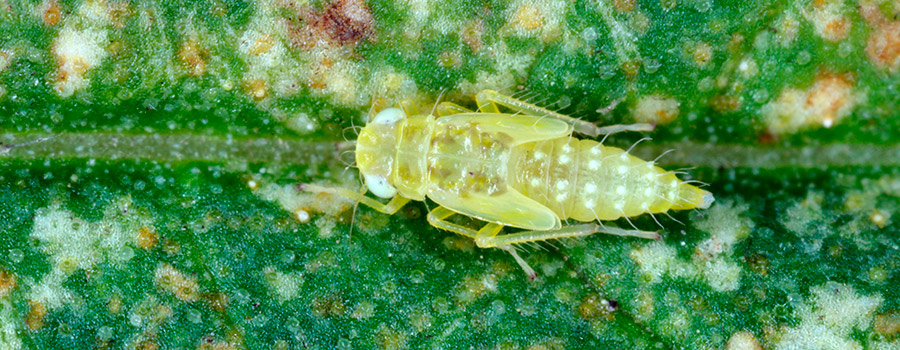
Whiteflies
Much like aphids, whiteflies also feast on plant sap. You’ll often find them on the underside of fan leaves. Here, they pierce plant tissue and tap into the internal sap flow. If left to populate, they’ll drain enough sap to cause several symptoms to arise, including yellowing, wilting, and a general decline in plant health. To add salt to the wound, whiteflies also leave honeydew behind after feeding, increasing the odds of a future fungal infection.
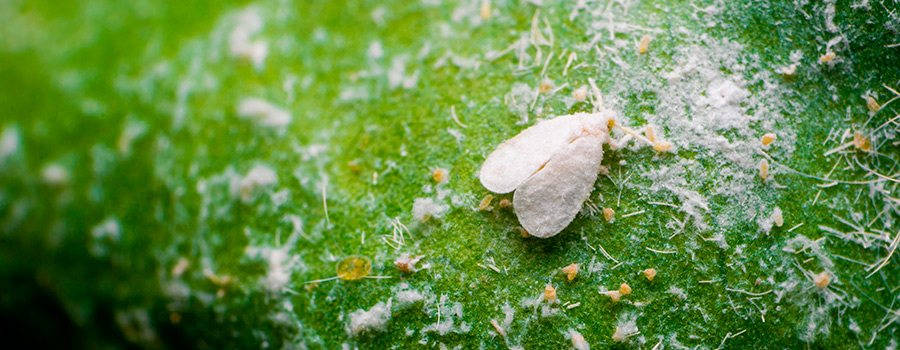
Fungus Gnats
Fungus gnats have a different mode of attack than the aforementioned pests. Instead of draining sap from the aerial parts of plants, they take their raging appetites underground to the rhizosphere. The flying adults lay their eggs in the soil close to the root zone. Upon hatching, their larvae wriggle through the soil in search of juicy and nutrient-rich cannabis roots. They chew into root tissue and damage the very structures responsible for uptaking ionic nutrients, bacteria, and algae. They also leave openings that allow fungal pathogens to gain a foothold, leading to root rot.
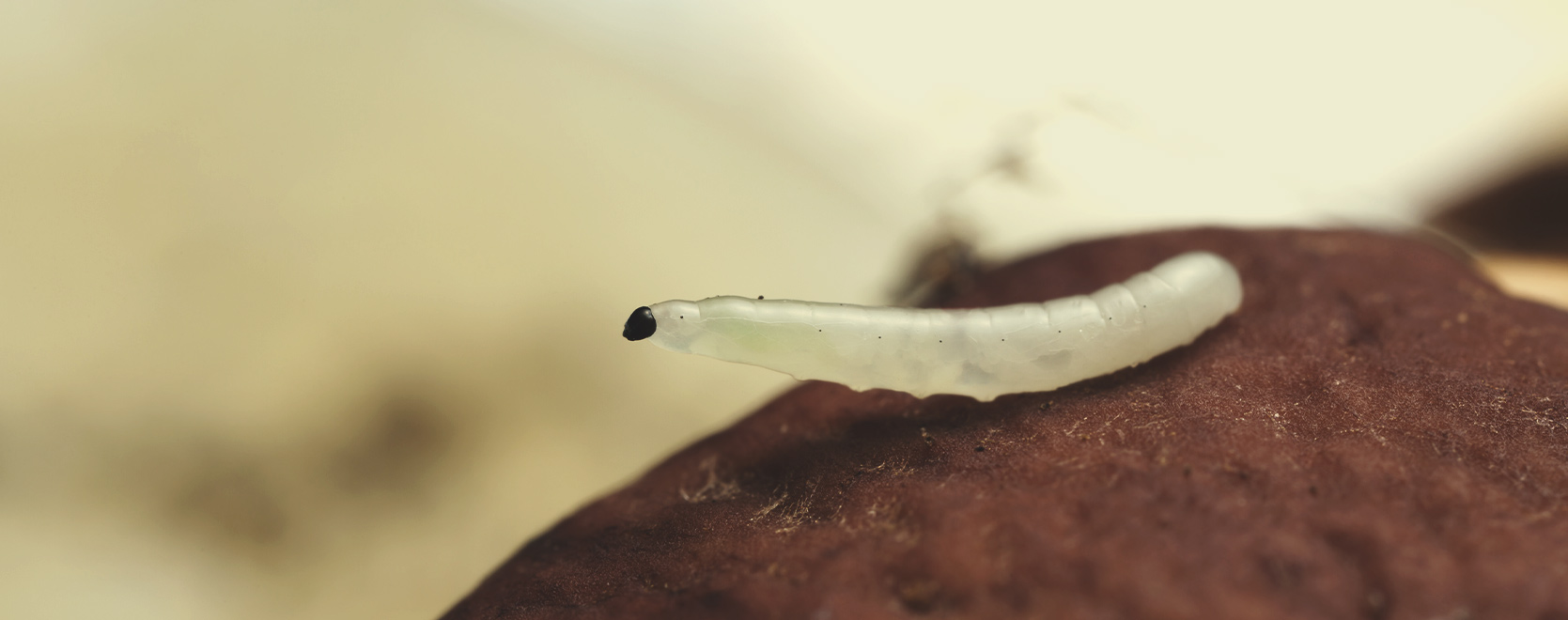
Leaf Miners
Leaf miners can quickly turn a luscious cannabis plant into an ugly mess. However, they are one of the easiest cannabis pests to detect, largely because they leave squiggly white trails all over the leaves. Leaf miners are the larvae of several groups of insects, including moths, sawflies, and flies. If you think about it, they live a pretty good life. Inside the leaves, they are protected from predators and bathed in an almost unlimited supply of food.
However, they’re a big problem for cannabis growers. As they tunnel through the leaf tissue, they damage the photosynthetic apparatus. While a minor case won’t cause too much damage, a serious infestation can cause stunted growth and poor yields.
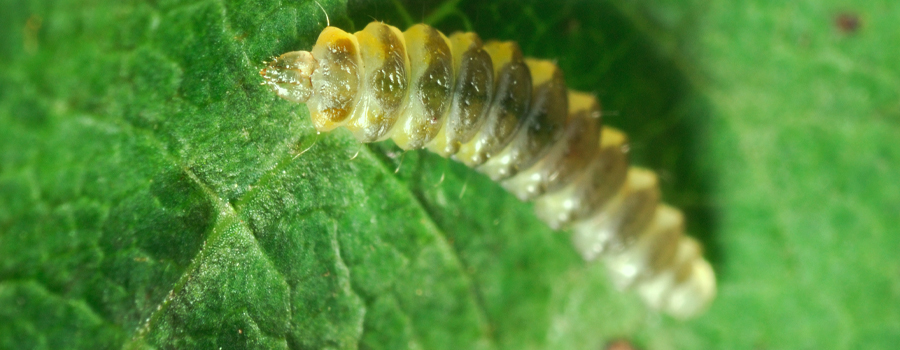
Spider Mites
Although small, spider mites also cause a serious mess. This common garden pest dwells on the underside of cannabis leaves. As their name suggests, these mites belong to the same class of insect as spiders, scorpions, and ticks. Much like aphids, they pierce plant tissue to feed on sap. However, they have another party trick that wreaks havoc out in the garden.
Spider mites spin fine, silky webs to protect them from predators. Left to their own devices, they’ll cover the entire canopy in this defensive netting. While it keeps them safe, it blocks out light and leaves a tangled mess all over the leaves and buds. The sticky resin that coats cannabis flowers makes it a royal pain to remove.
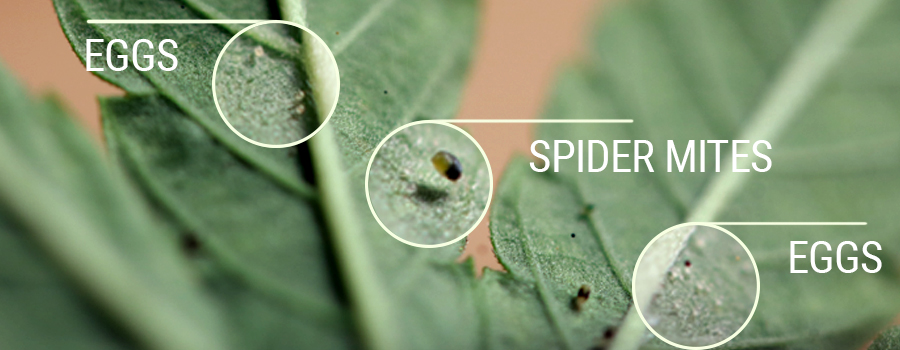
Thrips
Thrips, as it happens, also have an appetite for plant resin. Are you catching the theme yet? Cannabis plants are essentially a reservoir of insect food; they make sugars from carbon captured from the air, and pull up minerals from the soil. Insects have developed specialised anatomies to access these goods, and growers are tasked with making it harder for them to access.
Anyway, about thrips. These slender-winged insects are also known as thunder flies. There are around 150 different species in the UK alone. Even if you don’t see them, you can detect their presence by looking for their small black excrement spots. As well as vectoring plant viruses, thrips cause distorted growth, and can even prevent buds from forming.
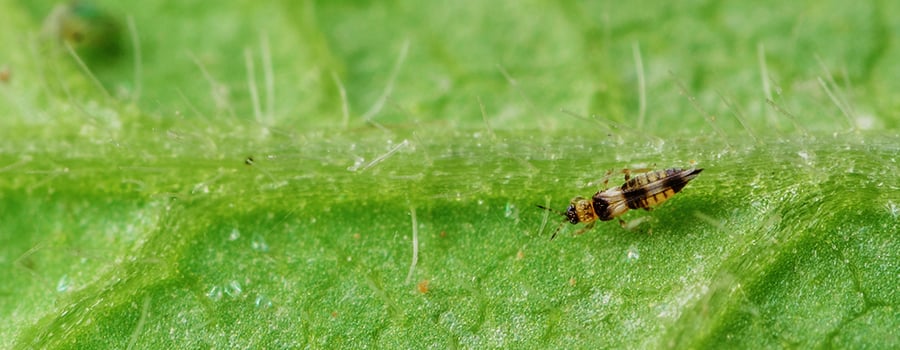
Caterpillars
Butterflies are a glorious sight in the garden. They look beautiful and help to pollinate flowers. However, their younger form has no qualms with tearing apart cannabis plants. Caterpillars are voracious eaters and love cannabis leaves. They leave holes all over the place, which impacts photosynthesis and restricts plant growth and development. In extreme cases, they’ll strip plants bare.
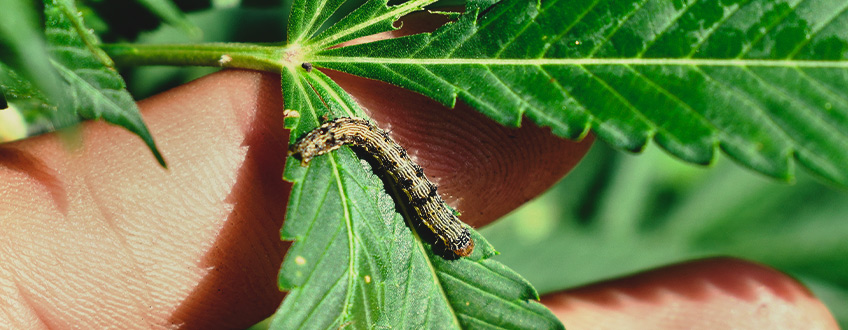
An Introduction to Integrated Pest Management
You’re now aware of the main cannabis pests. But how can you protect your outdoor grow? There are many different approaches you can take, from harsh chemicals to more environmentally friendly methods. The latter techniques fall under the umbrella of integrated pest management (IPM). This holistic means of dealing with pests opts for biocontrols that respect the local ecosystem before resorting to noxious chemicals.
The Principles of IPM
Learning about IPM[3] won’t just provide you with the solution to infestations. This broad subject area will inform you about prevention strategies and increase your knowledge of the most common pest species. It’ll also teach you how to monitor your plants, and what signs to look out for.
- Knowledge: This principle brings us back to knowing your enemy. Learning the life cycle and seasonal behaviour of key pests will inform you on what to expect, and when.
- Prevention: Superior to cures, preventive measures stop any damage from occurring in the first place. A solid preventative approach will save you lots of time, money, and effort.
- Monitoring: IPM specialists are scouts, first and foremost. You need to get used to entering your cannabis garden with no other intention other than to inspect your crop. Look out for key signs and symptoms with a careful eye for detail. A pocket microscope will help you to diagnose early, allowing you to treat your plants before the worst of the damage occurs.
- Intervention: When preventative measures fail, you need to intervene quickly and effectively. Knowing in advance what treatments to apply according to the pest species and magnitude of the infestation will increase the odds of successful intervention.
How to Prevent Cannabis Pests Outdoors
Again, prevention is at the core of any IPM strategy. By knowing your ecosystem, familiarising yourself with insect life cycles, and implementing your plan well, you’ll rarely run into serious trouble.
Insect Netting
When it comes to IPM, simplicity reigns supreme, and insect netting is about as simple as it gets. Use hoops to place netting across your beds early in the spring, before sowing a single seed. This will set up an impermeable boundary to prevent insects from using the soil as a habitat and laying eggs later in the season. Netting will help to keep flying insects out of your growing area, thereby keeping your plants safe from caterpillars, thrips, and other pests.
Insect Screens
If you’re growing in a greenhouse or polytunnel, you don’t need to set up insect netting. However, you’ll still need to open the windows during late spring and summer for ventilation; instal insect screens in the openings to prevent flying critters from gaining access. However, keep in mind that you’ll greatly limit pollination if you’re growing vegetables in the same space. Consider hand pollination or introduce beneficial insects.
Companion Planting
Companion planting involves growing specific species in close proximity to your weed plants. This strategy is twofold. Pungent herbs that contain high quantities of essential oils are good at repelling insects. Position them close enough to your weed crop, and you’ll create an aromatic shield that can help to defend against aphids[4] and other pests. Moreover, some species attract beneficial insects that act as natural predators of pest species. For example, dill attracts ladybugs, which spend much of their time munching on aphids.

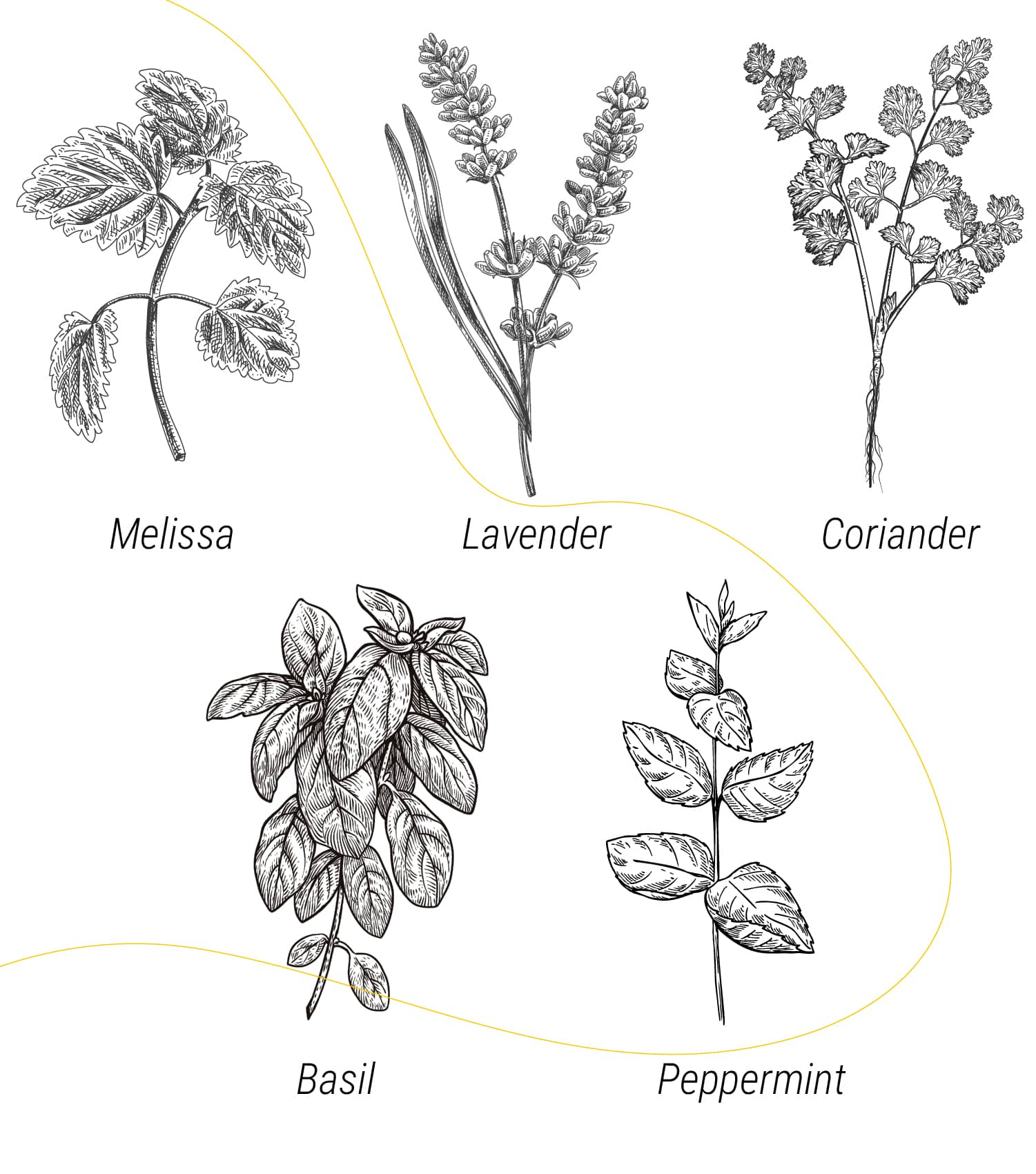
Preemptive Predatory Insects
Insects are a cornerstone of ecological health in the garden. They play an important role in the soil food web by helping to cycle nutrients and pollinate plants. Additionally, some insect species are skilled predators. The likes of ladybugs, lacewings, predatory mites, and parasitic wasps hunt down and kill many of the common cannabis pests. Aim to increase populations of these beneficial insects in your garden before an issue arises. Consider cultivating plants that attract them, such as yarrow, coriander, cosmos, mint, and nasturtiums. You can also purchase live insects and deploy them during the right time of the season.
Sanitation
Insects don’t always find their own way to your plants. Growers themselves are one of the biggest vectors of pests and diseases in the garden. Consider changing your clothes before inspecting your plants if you've just taken a walk in the forest or visited your friend's garden. Make sure to regularly clean your tools, and always destroy infested materials.
Regular Inspections
It goes without saying that you should inspect your plants regularly. Taking the lazy approach and letting nature take its course will increase the risk of pests running rampant. Head out to your garden early in the morning with a coffee, or late in the evening with a beer. Take a look at your plants from a distance first, and get used to how they look—this will help you to notice anything that seems off.
Next, get up close and personal. Check the tops and undersides of the leaves. Assess the main stem, branches, and petioles. Take a look at the root crown, and don’t forget to give your buds a once-over if plants are flowering.
Plant Health
Make sure your plants have access to all of the nutrients, water, and light they need to thrive. Healthier plants are less prone to disease. You can also monitor brix levels across the growing cycle. This will give you data on the photosynthate levels in your plants. In the view of some botanists, the higher the brix, the lower the risk of pest infestation.
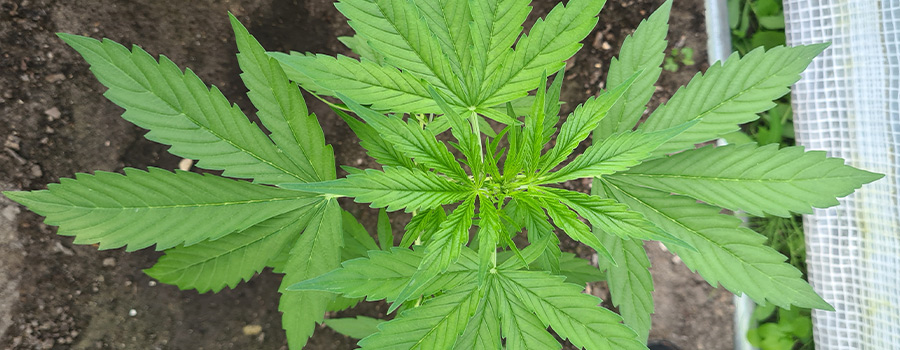
Prevention Doesn’t Always Work: Be Prepared
A solid prevention strategy should keep your plants safe and dramatically reduce your workload throughout the growing cycle. It’ll make tending to your plants leisurely and enjoyable, instead of frantic and stressful. However, even the most robust preventative approach can fail. When this happens, you’ll need backup treatments ready to deploy as soon as you detect a problem. Some of the most effective treatments for cannabis pests include:
- Beneficial nematodes: You can easily access beneficial nematodes at most garden centres. Water them into the soil to combat slugs and fungus gnat larvae.
- Neem oil: As a natural insecticide, neem oil works great against aphids, whiteflies, and spider mites.
- Bacillus thuringiensis: This naturally occurring bacterium produces toxins that kill larvae, including caterpillars.
- Beauveria bassiana: This entomopathogenic fungus produces strong enzymes that enable it to colonise and eat pest insects, including aphids, spider mites, caterpillars, and thrips.
- JADAM wetting agent (JWA): Made from canola oil and potassium hydroxide, this DIY insecticide helps to wipe out aphids, mites, whiteflies, thrips, and caterpillars.
Bugs Are No Match for Your Outdoor Cannabis Crop
No longer do you have to wonder how to keep bugs off marijuana plants. You’re aware of the most common species that attack weed crops, and you know the key principles of IPM. Most importantly, you’re equipped with the most effective preventative strategies to keep your weed plants safe and secure. If these options fail, which they sometimes do, you have numerous treatment options ready to deploy. Go forth and grow cannabis more confidently outdoors!
- Electric Nutrition: The Surprising Health and Healing Benefits of Biological Grounding (Earthing) https://www.researchgate.net
- Study linking beneficial bacteria to mental health makes top 10 list for brain research | CU Boulder Today | University of Colorado Boulder https://www.colorado.edu
- Guidance on Integrated Pest Management https://mass-cannabis-control.com
- Insects | Free Full-Text | Companion Plants for Aphid Pest Management https://www.mdpi.com


























